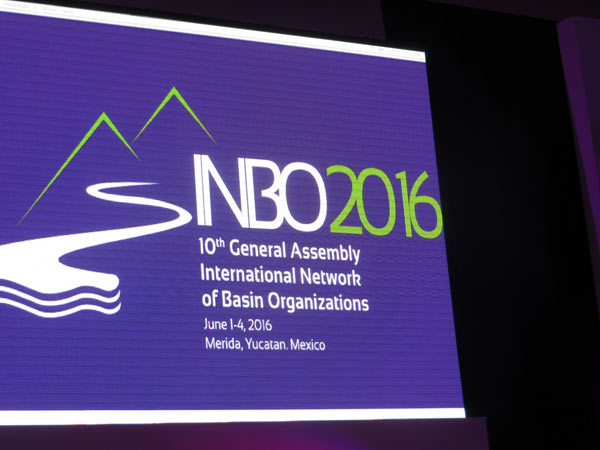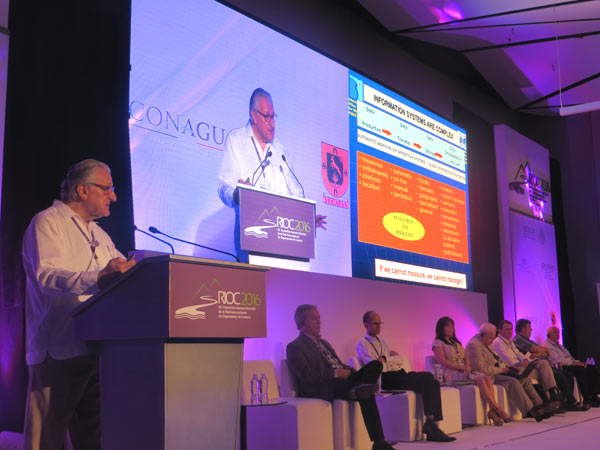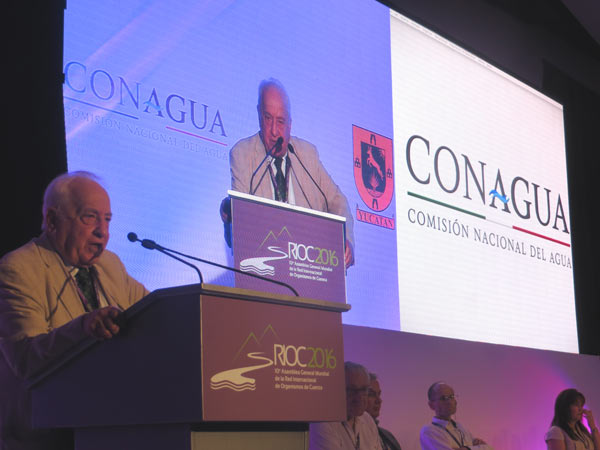INBO 10th WORLD GENERAL ASSEMBLY
1-4 June 2016, Merida, Mexico
10th World General Assembly of the International Network of Basin Organizations (INBO) was held in Merida in Yucatan. Just 20 years ago, in 1996, the first INBO World General Assembly took place in Morelia, Mexico and adopted the Declaration of Association and the Charter of Organization and Operation.

INBO was established during the constitutive assembly in 1994 at Aix-les-Bains, France, by organizations whose common goal was to implement integrated basin water resource management, which made a voluntary act of joining the charter adopted in 1996 at Morelia, Mexico. On this occasion, the INBO 10th World General Assembly was organized in Mexico.
INBO World Liaison Bureau meeting was held on the 1st of June. Permanent Technical Secretary Jean-Francois Donzier and Regional network secretaries (ANBO, LANBO, NANBOM NARBOM EECCA-NBO, CEENBO, MENBO) reported at this meeting. For the first time, countries of the American continent had so broad representation – more than half participants from the North America Regional Network (NARBO) and the Latin America Regional Network (Brazil, Mexico, Peru, etc.) totaling 88 delegates out of 150 participants.

In his speech at the Liaison Bureau Meeting Prof. V. Dukhovniy (Secretary of the Eastern Europe, Caucasus, and Central Asia Network of Water Organizations) underlined that, despite financial constraints and the only support from UNECE, Uzbekistan, the Russian Government, and GWP CACENA, the Network unites 83 organizations from 12 countries, while disseminating best practices through conferences, workshops, its web-site eecca-water.net, and publications and fostering the sense of common interests in efficient water management, environmental conservation, and sustainable development among all water organizations in this region. In this context, of importance is the initiated by SIC ICWC rubricator of Knowledge base supported by all member countries as a tool for collection, systematization, and storage of a wealth of knowledge and best practices.

INBO activity at the global scale would provide wider opportunities for the Knowledge base; hence, it would be practical to change it into a bilingual tool (Russian and English) and involve expertise and publications of other regional networks in it.
The official opening ceremony of the 10th World General Assembly took place on the 2nd of June 2016 and brought together, among other participants, local and federal authorities. The Mexico Secretary of the Environment Rafael Pacchiano Alaman noted in his speech that Mexico compensates the lack of capital investments in water infrastructure through enhanced water management, wider involvement of water users, and cooperation with national agencies from other countries within the High-Level Panel, which is represented by the President of the Republic Enrique Pena Nieto and 9 other Heads of State.
The governor of the State of Yukatan Rolando Zapata Bello underlined the importance and the need for provision of sustainable water supply in the state, taking into account that the country had monsoons and typhoons 3 months a year and drought the remaining 9 months.
The INBO President Lupercio Ziroldo Antonio marked the importance of the network in promotion of IWRM in river basins as a means of sustainable development. He underlined that “water is an integrative subject and INBO sees its role as the promoter of this idea all over the world.”
Mr. P. Kovacs, State Secretary of Water, Hungary, Mr. M. Faye, Minister of Water and Sanitation, Senegal, Mr. R. Ramirez, Director General of National Water Commission of Mexico, and Prof. J. Ganoulis, Special Secretariat for Water, Greece also took the floor during the opening ceremony.
Then, the President L.Z. Antonio presented the activity report, where put the greater focus on Basin Councils as a means to involve expertise and knowledge of water professionals and water users and mobilize funds for water. The practices of Basin Councils encourage enhanced control over operations of water administrations, more attention to complexities in their work and lead to stronger responsibility for decisions made, where the Councils should take part as equal partners.
The Director General of National Water Commission of Mexico Prof. Roberto Ramirez de la Parra reflected on the role of Community Councils in water management and use in Mexico. The country is located in the desert zone and, at the same time, receives 2/3 of water during three months of monsoons a year. Rainfall is unevenly distributed over the country from less than 500 mm to more than 2,000 mm a year. Annual available water is 447.3 km3, of which 92 billion m3 is used. Rivers stretch to 633,000 km in 731 basins. These river basins and 653 aquifers are grouped in 13 hydrological-administrative regions. Twenty six large river basins are managed by Basin Councils, while groundwater control and planning is performed by 88 technical committees. Water management is among top national priorities. National Water Authority includes all ministers and state secretaries at the head of Prime Minister. The basin water use planning system was adopted. In addition, for water security, 3 water forecast service centers were established, alongside with the National Disaster Prevention Center. Particular attention is paid also to development of rural extension services and conservation services that are strongly subsidized by the state.
The round table “Adaptation to climate change in basins” was opened by Bob Pietrowsky, Director of the Institute for Water Resources, U.S. Army Corps of Engineers, who presented the Institute’s initiative on the development of Climate risk informed decision analysis for various basins. To this end, they used the SIWI work of 2010 on «AGWA Network for Global Water Adaptation». The main point there was the assessment of potential economic damage or limitations in terms of water supply, irrigation and other uses, depending on the degree of risk.
The Director General of the Adoure-Garonne Water Agency (France) Laurent Bergeot demonstrated the basin planning system SDAGE combined with the long-term forecast for 2050-2070 and including the assessment of current water management in the basin and its changes in the future. Assessment was also made for a coastal area to study an impact of ocean level rise and changes in internal water quantity with temperature growth and rainfall increase (or decrease). This assessment was provided for each river, coastal zone, and basin as a whole. Water Committees take active part in this work by providing relevant data and evaluating financial potential to improve capacities for adaptation to various challenges.
Prof. V. Dukhovny in his speech underlined that currently, along with the climate change that was generally recognized and the adaptation, the boost of hydropower development following purely commercial interests, which is in conflict with IWRM principles, and the poor influence of the international water law on this process represent equal risks. “This idea was developed in my presentation at the session ‘Governance – key for IWRM success’ and was welcomed by Cambodia as a response to China’s actions along the Mekong River”, said V.Dukhovny.
The Office of Mayor Belinda C. Constant (Louisiana) presented the coordinator of the new basin initiative “Mississippi River Cities & Towns Initiative”, which drafted a treaty on river basins to reduce climate risk and achieve food and water security. The status of rivers, lakes and aquifers is a direct indicator of sustainability of urban planning, industrial development, and food supply. Ineffective water use as a result of excessive diversions and pollutants damage this status. Thus, the treaty envisages that the parties conserve quality and quantity of water and discharge only treated wastewater so that to maintain environmental flows and reduce industrial, municipal, and agricultural pollutant load in water bodies. To this end, the parties should strictly follow the water monitoring strategy, while preventing point and non-point pollution, increasing capacities of treatment plants and improving quality of treatment. The treaty also envisages a green zone along rivers, development of polders, periodical siltation of deltas, and adoption of sustainable mudflow protection practices. The initiative, under which the treaty was drafted, brought together 68 mayor’s offices of different cities and towns.
Mr. Marco Antonio dos Santos, Basin Committee of the Piracicaba-Capivari-Jundiai River (Brazil) underlined the role of basin agencies, especially during drought. The Committee has 22 people in its staff and represents the interests of various population groups (54 million people) and territories in the basin. The Committee organized active collection and dissemination of information, particularly on water allocation, drought tracking, etc. This work is supported by local municipalities that make significant contribution to the budget of water-related measures undertaken by the Committee.
Mr. Mhamed El Fasskaoui, Director, Souss Massa and Draa basin agency (Marocco) spoke about the importance of the community Council, especially in dry years, when the general procedure for reduction of water quotas of the users is needed. The Council makes appropriate decisions based on communities’ explanations on the potential damage that could be caused to specific zones. The Council proposes distribution of water deficit among the users, based on equal discrimination of the interests of all stakeholders, and such distribution is then approved by the director of the basin agency. Currently, the Council is going to develop a plan to account for climate change.
Another round table was dedicated to mandates, composition, role and means of the Basin Councils and Committees.
In France (Mr. Joel Pelicot, President, Loire Brittany Basin Committee), Basin Committees have been established since 1964. Since 1992, they have gained support from the Ministry of Environment and have been involved in SDAGE – master plans for basin water development and management. At present, the Basin Committees work for the European Water Framework Directive to achieve good ecological status of water bodies. This target should have been achieved by 2015; however, some delays were caused by the lack of funds.
In Mexico, the Lerma-Chapala Basin Council (Mr. Jorge Jimenez Campos) was created in 1989. Besides water and agricultural organizations, it comprises municipalities and hydropower entities. The Council deals with water allocation among users, approves the schedule of water releases, including for irrigation, which is the main user, and for energy. The Council is also represented by federal and provincial governments. In 2000, it adopted the ongoing IWRM plan.
The Spanish reporter presented the long history of basin councils referred to as Hyrdographic confederations. The oldest Confederation of the Guadalquivir River Basin was established in 1923 to serve water users on an area of more than 1.5 Mha. The Confederation is financed and managed by public, provincial, and private agencies and has quite large budget. Owing to such budget they succeeded to reconstruct water infrastructure on 866,400 ha in the last 15 years. Recently, the Confederation has been dealing also with ecosystem protection from floods, droughts, and climate change.
The First Vice President of the Seine Normandy Basin Committee Mr. Christian Lecussan came back to French experience. Particularly, he talked about French water policy, which, in his opinion, was based on 3 pillars: national water committee (main water decision making agency in the country); basin committees; and, water users. Thanks to such organized system, industrial pollution was reduced by 24%, salmon stock was restored, and drought and flood risk was mitigated.
The Special State Secretary for Water (Greece) Mr. Jaques Ganoulis described the national water management framework in Greece – “from public to local water committees”. In particular, the upper level is represented by a National Assembly comprised of the representatives of concerned ministries and all 14 main Greek basins. The river water use and protection committees are established at the local level.
Prof. V.Dukhovny from SIC ICWC presented the decision of the Uzbek Government on the transition to hydrographic basin management approach and the development of respective laws. He described the results on the improvement of water use, reduction of unit water inputs, and involvement of local communities. Activity of the Water Council at the South-Fergana Main Canal (WC SFMC) was particularly noted. Owing to joint actions of WC SFMC and local authorities and involvement of WUAs, they managed to improve equitability of water distribution, reduce water conflicts, increase stability of water supply, and reduce by 20% the total water diversion. This helped to overcome drought in 2008 without limiting water user demands.
Next day of the General Assembly was started with the discussion of basin management planning and funding.
Mr. Oscar Santana, Director General of the Rio Bravo Basin Organization (Mexico) in his presentation demonstrated the record of public participation in basin organizations. This has two positive aspects: (1) participation of various stakeholders contributes to democratization of governance, while involvement of water professionals from different levels of water hierarchy promotes better awareness and consensus between water professionals and water users; (2) contribution to funding that implies mutual responsibility. Initially, there was even a rule that water benefits would be provided proportionally to financial contribution. In addition, public participation implies such advantages as transparency in all kinds of relations, equity, equitability, and anti-corruption.
Burkina-Faso has started late to adopt the above practices, as said Mr. Fofana from OMVG. However, they have already succeeded in SDAGE and co-financing (52% from the public budget and 48% from water users). Same practices are applied by Martinique, which despite being an island state with the population of 1 million people, has already organized the Water Parliament.
The last topic discussed during the Assembly dealt with the Forum of international cooperation organizations. Vice-President of the Board of International Water Resources Association (IWRA) Prof. Gabriel Eckstein proposed to seek for more sustainable solutions in all spheres of the international water law, while disseminating best solutions. Particularly, he noted the positive role of interstate relations in the US and the US Supreme Court in this respect.
Ms. Aziza Akhmouch, Head of the Water Governance Programme, OECD presented the content 12 OECD principles on water governance that were unanimously adopted by all the OECD member countries. These principles address such points, among many others, as: clear distinguishing governance and management roles at institutional level; long-term growth; water management within hydrographic boundaries; openness and transparency of information; long-term sustainability; stakeholder engagement; innovations; anti-corruption; water monitoring and protection; IWRM; environmental demands; adaptation to climate change; etc.
Mr. A. Mamadzhanov, Secretariat of the UNECE Water Convention drew attention to opening of the Water Convention for accession by any UN member-state and called upon the participants to start organizing the accession to the Convention. While presenting work in the Aral Sea basin, he demonstrated the UNECE efforts in solving the sensitive issues of transboundary cooperation in Central Asia. He noted successes of UNECE in the promotion of cooperation in the Chu-Talas basin and intensive work in support of joint activities of the five countries regarding dam safety, environmental improvement, and water quality. He also underlined the UNECE assistance to IFAS in the development of common information space.
The Permanent Secretary of the Ibero-American Water Directors Conference Mr. Adriano Garcia-Loygorri characterized the work of this newly established cooperation body between the Spanish and Portuguese speaking countries of the American continent. The mandate of this body includes exchange of information between the countries in these two languages.
Cooperation between Bolivia and Peru was organized for sharing of Lake Titicaca. Mr. Alfredo Salinas from the Autonomous Binational Authority of Lake Titicaca said the two countries felt that they could not manage effectively the lake without each other. “We estimated the added value of cooperation, enhanced exchange of information, and maintain joint actions”, he added.
Prof. V.Dukhovny in his speech demonstrated successful development of water cooperation among the Central Asian states during the first decade of their joint activities and further rise of aspirations towards absolute national sovereignty, particularly from the side of upstream countries. Despite a number of signed Agreements and adopted Declarations, some setback is observed in cooperation, as well as orientation to current immediate tasks rather than to long-term ones. Nevertheless, Uzbekistan, Kazakhstan and recently Turkmenistan, while guiding by the UNECE 1992 Convention to which they acceded, have taken some measures to promote cooperation even in new realities. Particularly, Uzbekistan and Kazakhstan organized the development of a common information system, all three countries take active part in funding of the interstate basin organizations, and they implemented the program of joint capacity building for upper and middle level staff of water hierarchy. Uzbekistan also is an initiator and active promoter of IWRM in the Fergana Valley. This work allowed avoiding grave consequences of the dry year 2008 and saving more than 200 Mm3 of water a year.
Finally, the Assembly adopted the Declaration and nominated the new INBO President (Mr. Roberto Ramirez de la Parra, Mexico), who took over the mandate from the former INBO President (Mr. Lupercio Ziroldo Antonio, Brazil).
The final day was the technical visit to familiarize the participants with the ancient Maya traditions of irrigation and water management.
Conclusions drawn from the World General Assembly:
1. The basin approach is increasingly applied all over the world as the main tool for improvement of river basin management.
2. Basin Councils are widely functioning to promote stakeholder engagement in water allocation control, water monitoring, management, and financing.
3. This global campaign is accompanied by the development of Master plans for basin water development and management in each basin, with adaptation to climate change and future challenges as a part of such Plans.
|